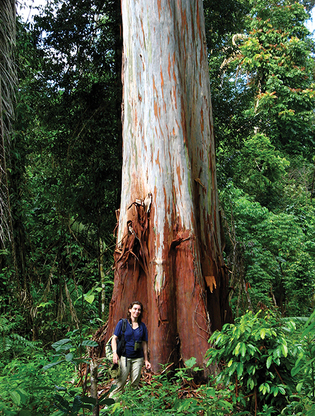
Cam Webb
Kinari Webb ’02MD has studied orangutans, worked to save rain forests, and survived “the most toxic thing on the planet.”
View full image
Kinari Webb ’02MD, interviewed in these pages 13 years ago, is well worth another round. Webb, who considers herself a planetary health doctor, had set off to Indonesia shortly after finishing her family medicine residency. She’d already been to Borneo in 1993 to study orangutans, a trip that opened her eyes to the rapid demolition of the rain forests. About a decade later, Webb founded Health in Harmony and returned to Borneo. For the last 17 years, she and staff members have worked to slow the climate crisis by reversing deforestation in Indonesia, Brazil, and Madagascar. She also cofounded a clinic where patients can pay for medical services with a single tree seed, or even animal dung. Webb’s journey is documented in her new memoir, Guardian of the Trees.
Lee Anna Jackson: In Guardian of the Trees, you say you tell the story of your own healing from layers of colonialism. You write that some people saw you as a white savior. Would you tell me about an instance when you felt that way?
Kinari Webb: When the top Indonesian newspaper came to do a story about the Alam Sehat Lestari clinic, I insisted they take a picture of Hotlin Ompusunggu—my cofounder—and I. The cameraman used the one picture of just me. Without realizing it, I played into some of that. I wish I could’ve said, “Pull that!” But I couldn’t. I was the only non-Indonesian, and here was this story that was like a cultural story of a white savior. And it just pisses me off! Hotlin felt so disrespected. She [and the whole team] were giving so much of their lives to this and they were not seen.
LAJ: Were you physically caring for clinic patients?
KW: There’s a law in Indonesia that a foreign provider can’t care for patients directly, but they’re allowed to do teaching. Our young Indonesian doctors were all coming straight out from medical school, so [it was helpful] having a more senior physician, who could be by their side and discuss cases. We based our model on the Mayo Clinic.
LAJ: How did you end up getting stung by a jellyfish in 2011?
KW: I was in Borneo swimming in the evening after clinic. A box jellyfish is the most toxic thing on the planet. A lot of people don’t survive. It was excruciatingly painful. I just recently had a baby, and my dad asked me afterwards which was worse. Without question, the jellyfish! Not even close. I spent two years in bed and four years really sick. In my third year, I almost died again. I always joke that I believe in radical listening and that communities always know what the right solutions are. But somehow, I didn’t listen to them when they told me not to swim.
LAJ: Where did your desire to do this kind of work come from?
KW: My parents were hippies. They were both very well educated and very focused on a kind of academic, scientific knowing of the world. And I just assumed that I would follow in that path. Growing up in New Mexico, I spent all my time [in nature]. We had a garden. We grew our vegetables. I would go up into the hills and spend most of the day in the wilderness. If you spend time in the wild when you are young, you understand how everything’s interconnected with the natural world and that our survival is absolutely just dependent on the natural law. This might be partly why indigenous communities get it so well. That and the fact that a lot of them probably use hallucinogenics!
LAJ: Have you tried any hallucinogenics?
KW: Yes, I have. I’ve done Ayahuasca. I was in the Amazon, in the Asháninka territory, on the border of Peru. And I was doing radical listening with the wider government structure there. It was a very amazing four-hour conversation. At the end of that meeting, I said to an indigenous man, who is kind of like the governor of that region, “I feel like I need to ask the rain forest herself for permission to work in the Amazon.” He looked right into my eyes and said, “Yes, you do.” A shaman then told me, “The world needs to heal from colonialism. This medicine is one of the key ways to do that.” And then later that evening, the cups were passed around. It was amazing.
LAJ: What answer did you receive?
KW: The forest said, “The question is not whether, the question is how. If you do the work, the way that it was done in Indonesia, with loving, careful attention to every single step, honoring all the parts and all the pieces, and all the people, and all the facets, then beauty will unfold. But if any piece is disrespectful or done too fast, it will all just collapse.”
 loading
loading